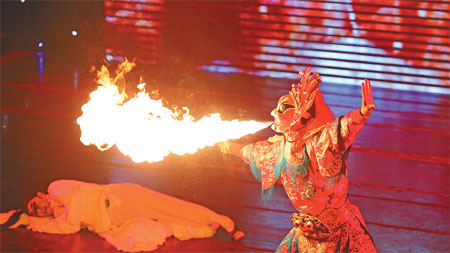 |
|
Fire 'breathing' in Sichuan Opera is usually followed by the face-changing display for which it is renowned.
|
Lisa Bielby is the first foreigner in history known to have participated in a Sichuan Opera contest.
Born in Michigan of the US, Bielby started to study drama in her hometown when she was 13 years old.
When she came to Chengdu at the age of 24, she enrolled in the provincial Sichuan Opera School to learn the more orthodox skills of recitation, acting, singing and acrobatics.
But she was not the first and only foreign student registered in the school, showing that the ancient opera has gradually become a global phenomenon.
Inscribed on the national intangible heritage list in 2006, the ancient art form is widely known for less constrained singing than the more popular Peking Opera.
Dramas are blended with local dialects, customs, folk music and dances into a more humorous form unique to Sichuan culture.
Face changing is the highlight, a legacy from ancient times when it is said people painted their faces to drive away wild animals.
Modern Sichuan Opera has perfected it into an art.
Performers make their own masks and no one else knows how they work as one image flicks in front of another.
Different masks represent changing demeanors and states of mind to show emotions and sudden switches in mood to achieve artistic effect.
The dramatic art is mainly presented in three forms - the wiping mask, blowing mask and pulling mask techniques.
Wiping mask requires performers to paint cosmetics on a certain part of their faces.
We Recommend:
